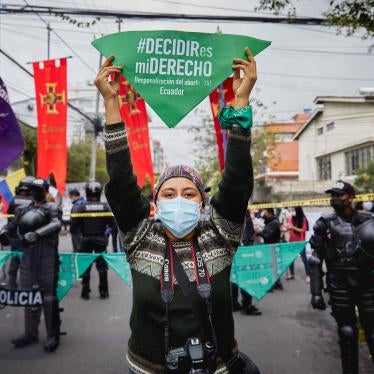The Inter-American Court of Human Rights has helped to progress the fight against gender-based violence by recognizing a form of violence many women experience, and yet has been invisible for many years. In January 2023, the court used the concept of “obstetric violence” for the first time in the case of Brítez Arce v. Argentina, defining it as “a form of gender-based violence, exercised by those in charge of health care for pregnant persons accessing services during pregnancy, childbirth and post-partum.”
Cristina Britez Arce was nine months pregnant when an ultrasound showed a dead fetus. She was hospitalized to induce labor but died of cardiac arrest.
The court found that Britez did not receive the required medical treatment considering the several known risk factors of her pregnancy, nor did she have the necessary information on treatment alternatives. Instead, she was “subjected to obstetric violence” that ultimately lead to her death.
Among other things, the court ordered the Argentinian government to design a campaign to disseminate information on the human rights related to pregnancy, childbirth, and postpartum and on situations that may constitute obstetric violence. This is the first time a judicial ruling recognized the state’s obligation to prevent obstetric violence to fulfill several human rights, including the rights to life, health, and humane treatment.
Human Rights Watch has previously conducted research into abuses experienced by women during childbirth, and the World Health Organization has spoken out on how women during childbirth in hospitals have been physically and verbally abused, sterilized, denied pain medication, and affected by life-threatening, avoidable complications due to neglect.
Other human rights experts have also already recognized obstetric violence and its harms. The United Nations special rapporteur on violence against women has underlined that mistreatment and violence against women during reproductive health and childbirth care in hospitals threatens the rights to life, health, physical integrity, privacy, autonomy, and freedom from discrimination. And, UN, Inter-American Commission, and African Commission human rights experts jointly urged governments to address obstetric and institutional violence against women in healthcare facilities and to take all possible practical and legislative measures to prevent, prohibit, punish, and redress such acts.
Obstetric violence is anything but invisible to the pregnant people who experience it. International, regional, and domestic legal and judicial systems should follow the Inter-American’s court decision in recognizing obstetric violence as a human rights violation and enforcing the obligation of governments to respect and protect the rights of pregnant people during pregnancy, childbirth, and postpartum.








